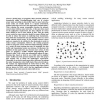125 search results - page 1 / 25 » Reducing Average Power in Wireless Sensor Networks through D... |
ICC
2009
IEEE
14 years 4 months ago
2009
IEEE
—The use of variable data rate can reduce network latency and average power consumption, and automatic rate selection is critical for improving scalability and minimizing network...
JCP
2007
13 years 9 months ago
2007
When the environmental conditions are stable, a typical Wireless Sensor Network (WSN) application may sense and process very similar or constant data values for long durations. Thi...
TSP
2008
13 years 9 months ago
2008
We minimize average transmit power with finite-rate feedback for coherent communications in a wireless sensor network (WSN), where sensors communicate with a fusion center using ad...
JIPS
2006
13 years 9 months ago
2006
In this paper, we proposed a MAC protocol, which can dynamically adjust Listening/Sleeping time rate of wireless sensor nodes according to data traffic load. In sensor networks, se...
GLOBECOM
2010
IEEE
13 years 7 months ago
2010
IEEE
We investigate flow rate optimization on a wireless link with randomly varying channel gain using techniques from adaptive modulation and network utility maximization. We consider ...

